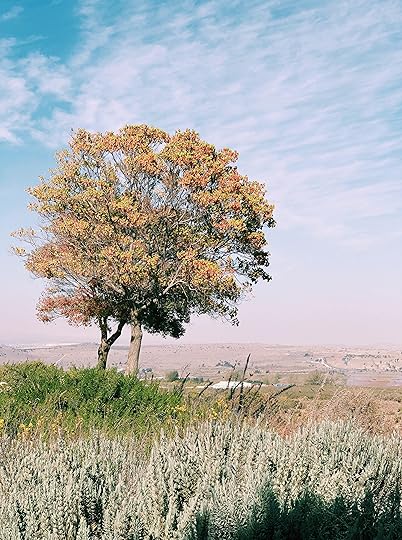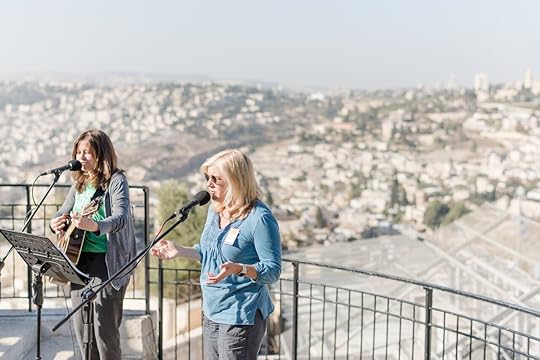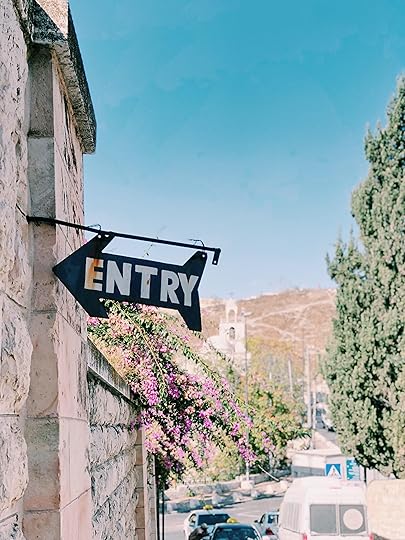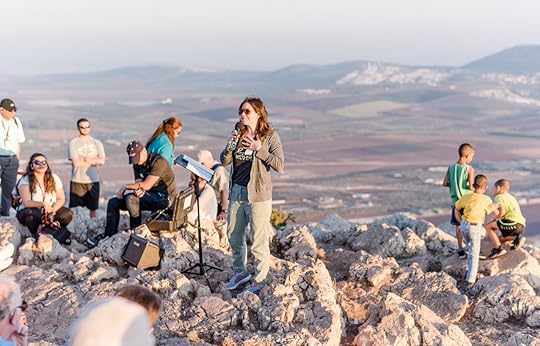Kelly Minter's Blog, page 9
January 23, 2018
My Perfect Night: 15 Ideas for the Table (Plus a 15 Bean Soup Recipe)
If I could distill my perfect night, it would include being around the dinner table with family and friends, eating something homemade. In homage to a hearty winter 15 Bean Soup that my mom recently served me, here’s 15 things I’ve learned about life around the table. (Recipe provided at the bottom of this post.)
#1 You don’t have to be fancy to have people over. Cook and they will come.
#2 Cook seasonally when you can. Fruits and vegetables that are in season will taste better, potentially provide more nutrition, and disappear more quickly from your guests’ plates. For instance, no one wants 15 Bean Soup in July (except me, maybe). But in sub-freezing temperatures, it hits the mark.
#3 Your house doesn’t have to be perfect. I try to have my house mostly in order when I invite people over so they can unwind in a clear and uncluttered space. But I fight the temptation to have everything perfect. Otherwise, I’d hardly ever entertain.
#4 You don’t have to spend a lot of money. I love soups specifically for this reason. You can feed a lot of people for a minimal investment. Recipes based on basic staples like pastas, grains, beans, and vegetables can go a long way for a little amount.
#5 Cook what you know. Bring your signature dish or your mom’s specialty from your childhood. People love consuming the food that’s part of your story and tradition.
#6 Invest in a collection of bowls, dishes, and platters (over time). This doesn’t mean you have to collect expensive or fancy items. Just go with a theme you love and build on it. For instance, a few years ago I found some clearance Williams & Sonoma napkins. I use them when I’m serving my nieces and nephews frozen pizzas or setting the table for a fancy dinner party with adult guests. When people see those napkins, they know they’re at my house.
#7 Ask people to bring stuff! People are almost always happy to help. Tell them what you need to take the pressure off… cheese, crackers, drinks, a salad, dessert. Eliminating an item or two will make all the difference for you as the host.
#8 Be intentional. I can’t tell you how many times in a week I have the thought, I really need to have him/her/them over. And then 8 months go by. Put a night on your calendar and make it happen. Even if you have to schedule it 2 months out, it will be here before you know it.
#9 But know you can be last minute, too. The other day a friend of mine told me I needed to create an app that alerts my community whenever I’ve made a soup so they know to head over. Too bad I have zero tech skills. The point is, you don’t always have to plan a dinner party days out. A last minute invitation can be just the cure for friends experiencing a lonely or quiet night in.
#10 For fancier dinners, decorate classy but inexpensive. A few good Ball Jars filled with fresh cut flowers still does the trick—especially if one of your friends has an eye for arranging. My sister in-law is the best at this, so I always tap her to put the table together for fancier get-togethers. And on my own, even I can’t mess up a fresh flower.
#11 Takeout is allowed (just not all the time). A few weeks ago, I asked my brother’s family over for dinner. I had sublime intentions of making it to the grocery store and spending a couple leisurely hours chopping, sautéing and listening to Frank Sinatra. And then life happened. So I ordered burgers and fries for everyone. And it was altogether lovely.
#12. Cook what’s already in your fridge and pantry. You’d be surprised at what you can put together with that frozen pound of meat in the fridge, half package of pasta with a rubber band around it in the pantry, and that 28 oz. can of tomato sauce in your Lazy Susan. Jump online and Google recipes with the ingredients you already have.
#13. Keep good coffee and tea on hand. Whether someone’s just stopping by or I need something for after dinner, I always keep coffee and tea on hand. I have a tea and sugar set I love, along with an assortment of mugs and stirring spoons I’ve collected over the years. Presentation goes a long way with guests, and it’s easy to execute with a few economical pieces.
#14. Reserve a treat drawer for kids. Okay, I’m stretching here near the end. Right now I’m wishing my mom had made 7 Bean Soup instead of 15. At any rate, I actually do have a little wicker basket that I keep treats, snacks, and candies in for when little ones come to my house. They know right where it is. I keep it at their level. They love me for it.
#15. Learn a new dish in the new year! I tend to fall back on my old standbys, but last year I made an Indian dish in my crockpot and tried it out on some family and friends. It was a hit! I learned how to use spices I don’t normally use like saffron, cardamom and garam masala, and I opened myself up to a host of other recipes I want to try.
15 Bean Soup Recipe
My mom always has something bubbling on the stove or baking in the oven. As a result, she has a lot of kids and grandkids who have become expert grazers. The basic problem for her is that she’s set the bar high and now we expect her to perform. Every. Year. She’s getting a little tired, and we don’t really care. We can’t help it—she’s created food dependents.
This year, she threw together a 15 Bean Soup that we downed like Winter Olympic champions. This soup is easy to make, nourishing, and hearty—if you’re going to serve a soup in the thick of winter, don’t ladle into people’s bowls anything less than hearty. Winter is not the time to go meager on people. Check out the ingredients and steps below.
Download the recipe here.
As we go into a new year, I’m so thankful that we see calls to hospitality in some of the New Testament letters. I believe cooking, eating, and communing together is near to the heart of Christ. So let’s get cooking.
I believe cooking, eating, and communing together is near to the heart of Christ. So let’s get cooking.Click To Tweet
The post My Perfect Night: 15 Ideas for the Table (Plus a 15 Bean Soup Recipe) appeared first on Kelly Minter.
January 18, 2018
Waking Up To An Incoming Ballistic Missile Alert
 I had just woken up when the following alert came across my phone: “BALLISTIC MISSILE THREAT INBOUND TO HAWAII. SEEK IMMEDIATE SHELTER. THIS IS NOT A DRILL.”
I had just woken up when the following alert came across my phone: “BALLISTIC MISSILE THREAT INBOUND TO HAWAII. SEEK IMMEDIATE SHELTER. THIS IS NOT A DRILL.”
It’s amazing what mental gymnastics one goes through when a message like this comes through. I processed the information at the speed of a sloth climbing a tree trunk. I just couldn’t quite get my head around what I was reading. My friends and I decided to head to the hotel lobby to find out what exactly the protocol is when a ballistic missile is about to blow the island you’re vacationing on off the planet. I hadn’t thought this through when packing for Maui.
The scene in the hotel lobby was something of a slow motion panic. Families were huddled together, guests were asking the hotel staff questions, crowds were hovered around the televisions at the bar, scraping for any bits of information. Everyone was on their phones. One woman passed me while FaceTiming with a loved one, cupping her hand over her mouth in disbelief.
I asked the first hotel employee I saw, “So, I’m thinking you’ve probably had something like this happen before, right?”
“Never,” she said. Not an ounce of reassuring comfort escaped her expression. “All I know is that if a missile’s been launched, we have 26 minutes to intercept it,” she said. “We’re telling people to go back to their rooms and close the shades.”
I decided in that moment that if a missile was really headed our way, I’d rather be looking out over the Pacific ocean than cooped up in my hotel room, curtains drawn. Three of us walked outside under the pristine blue sky and met our friend who’d run out to get us coffee before the threat. (Because, priorities.)
I learned several things in the ensuing moments leading up to the overwhelmingly good news that this was a false alarm—an alert that came exactly 38 minutes after the first devastating notice to take shelter.
If A Ballistic Missile Is Headed Your Way…
1. You Find Out Where Your Hope Really Is
The very first thing I did when I read the alert was to scan the internet. I wanted more information… Were other news outlets reporting this? Did anyone know if we could intercept this missile? How long until something like this would reach us? It wasn’t but a few seconds down this trail when it occurred to me, stop gathering information and START PRAYING! (I simply have to be the Lord’s most frustrating Christian alive.)
My first call was to my pastor who prayed over us from the snowy hills of Tennessee. Then my friends and I huddled together and called out to the Lord. In the middle of all the what-ifs, what felt remarkably solid was Jesus. Not that He would necessarily spare us, but my overall belief in Him, His goodness, His supremacy, and my eternal salvation through Him was sure. I can’t say that each of these thoughts was this clear or coherent, but when it came right down to it I had no doubt that all of these were true and Jesus was my only hope. There was absolutely no one else to turn to.
In the middle of all the what-ifs, what felt remarkably solid was Jesus.Click To Tweet
2. It Doesn’t Matter How Much Money You Have
As concerned couples were abandoning the immaculately kept golf course and pristine tennis courts, trying to make any kind of sense of things, no one had an advantage. No one had enough money to buy his or her way out of this. We were all in the same boat or, more accurately, on the same island at a most unfortunate time. A missile is not a respecter of wealth, education or social status. There was no upper or lower hand.
This was a significant reminder for me because it’s so easy to buy into the lie that if I have this amount of money, or that measure of success, or these certain resources, I’ll have everything I want and simultaneously be spared from what I don’t want. When I stood outside that hotel lobby I could see more clearly why Jesus taught us, not to put our hope in money! As the blood drained from people’s faces—some who had everything a person could want in life—Jesus’ piercing question sharpened to an even finer point, “What does it profit a person to gain the whole world but lose his soul?”
I’ve been reflecting on this over the past few days—for whom and what am I truly living. My increasing desire is to live for what Jesus says matters. In the end, nothing else will.
My increasing desire is to live for what Jesus says matters. In the end, nothing else will.Click To Tweet
3. You Realize How Short The Time Is
One of the most sobering lines of the emergency alert was “THIS IS NOT A DRILL”. It’s like the old adage, “Life is not a dress rehearsal”—we’re living the real thing, right now. There are no second lives to do this one over. However many years we have we’re to steward the grace of Jesus “making the most of every opportunity,” as Paul put it in Ephesians. We’re to ask God to “teach us to number our days” as the Psalmist says in Psalm 90, so we can live every day fully for Christ and His purposes.
I can’t say that my life flashed before my eyes or that I thought death was absolutely imminent. But I did ponder, what if this is the way it ends for me? There’s so much more I want to do. I thought about how much I still want to teach the Bible and minister to people, the missions I want to keep doing in the Amazon and Moldova, the influence I want to have on my nieces and nephews, more time with my parents and family and friends. I realized how short the time really is, even if a missile didn’t end up hitting and I were to get another 50 years. The book of James still calls this a vapor. It made me more intentionally ask myself, what am I doing with the amazing gift and grace of another day?
4. It’s Nice To Have A Clear Conscience
In that very short window of time one of the most surprising things I was thankful for was a clear conscience. I would have never thought this to be one of the big takeaways, but it was a significant realization for me. In that moment, I was so grateful there wasn’t anything I was covering up, running from, or regretting that the Lord and I hadn’t already dealt with. I can’t say that this has always been the case with me. There have been seasons in my life where if I’d found out that a ballistic missile was aimed my direction I would have thought, yep, that feels about right.
A clear conscience is not the same as perfection. I certainly don’t always get it right (not even close), but there was something peaceful and freeing about knowing that I wasn’t living in blatant sin. That I’m following the Lord with open-handed obedience. People have asked me over the years how I live in obedience to Jesus, sexually and otherwise. The first answer I give is that I’ve come to discover—sometimes the hard way—that absolutely no pleasure is worth sacrificing the peace I have with Jesus. When the threat of a missile came my way, the peace of a clear conscience was a surprising gift.
I've come to discover that absolutely no pleasure is worth sacrificing the peace I have with Jesus.Click To Tweet
5. It’s Good To Know Where You Stand With Jesus
Besides the words “BALLISTIC” AND “MISSILE”, I was most haunted by the word “INCOMING”. Because an outgoing missile is not a problem—it’s the incoming ones you have to worry about. And yet when I think about what Jesus tells me I have to worry about most, He turns this upside down. He says that it’s not what comes into a person that’s the problem, rather it’s what comes out of a person’s heart.
“It’s not what goes into the mouth that defiles a person, but what comes out of the mouth—this defiles a person… Don’t you realize that whatever goes into the mouth passes into the stomach and is eliminated? But what comes out of the mouth comes from the heart, and this defiles a person. For from the heart come evil thoughts, murders, adulteries, sexual immoralities, thefts, false testimonies, slander. These are the things that defile a person; but eating with unwashed hands does not defile a person.” (CSB Mt 15:11, 17-19)
In other words, however bad all the INCOMING stuff is, it’s the outgoing stuff of our hearts that’s our far greatest problem. Both the Old and New Testaments refer to it as sin. The law exposes it. Religion tries to fix it but can’t. We try to polish it with good deeds, or escape it with pleasure or wealth or success, or decide we don’t believe in something so drab and dour and out of touch as sin. But we simply know it’s there, whatever we may try to do with it.
The stunning, absolutely exhilarating truth of the Christian faith is that Jesus died on the cross and rose from the grave to save us from our guilt, our shame, our sin. To purify our hearts so that when the day of reckoning comes for each of us, we won’t have to fear the incoming arrows of the enemy nor the outgoing sin of our hearts. The only thing God will see in us is the righteousness of Jesus. This is what is referred to in Scripture as the incredibly good news of the Gospel.
In the face of what ended up being a false alarm, this Gospel rang ever true.
The post Waking Up To An Incoming Ballistic Missile Alert appeared first on Kelly Minter.
January 4, 2018
A Newer You in the New Year
Happy New Year, friends. If you’re anything like me, every last Christmas tree needle has been swept from the house, the gnarls of Christmas lights are tucked away in boxes, and you just found a stray ornament that didn’t make it into those boxes—one that will possibly sit on your dresser until next year, because you’re just not walking that thing down into your unfinished basement when it’s 6 degrees outside. Or maybe no one is like me. At any rate, here we sit at the top of a new year. A fresh slate prime for dreams and ambitions to be etched into its stone. Another chance to strive for what might not have been accomplished last year. A new beginning.
In the midst of the excitement and zeal for the months ahead, a stark reality exists—a change from one year to the next doesn’t mean we’ve changed. But you knew that. Whatever we hope will be different about ourselves in 2018 will only be so if we do something different than we did last year. If we make changes. Thus, the ever-popular New Year’s Resolution.
But I don’t want to talk to you about resolutions today. Rather, I want to talk about milk versus meat. I want to talk to you about being spiritual people instead of worldly people, or merely human people. This is actually really thrilling and may be our answer to not only a new year but also a newer us. Follow me for a moment into Paul’s letter to the Corinthian church—a letter particularly applicable to our day and culture.
Paul wrote that he was speaking to the church in words “taught by the Spirit, explaining spiritual things to spiritual people.” (1 Cor 2:13.) As I sometimes struggle to understand the things I read in the Bible, or even the deeper Christian writings, my first thought when reading this passage this morning was, Lord, if the Spirit teaches spiritual things to spiritual people—and often I don’t hear you in the way I long to—am I not as spiritual as I need to be? Have I let the pleasures and comforts and selfish desires of this world overtake me?
I know what you’re thinking— “Don’t be too hard on yourself or so legalistic, especially at the top of a happy New Year.” But it felt like a good and liberating question to ask the Lord. I continued reading…
“For my part, brothers and sisters, I was not able to speak to you as spiritual people but as people of the flesh, as babies in Christ. I gave you milk to drink, not solid food, since you were not yet ready for it…because you are still worldly. For since there is envy and strife among you, are you not worldly and behaving like mere humans?” (1 Cor 3:1-4.)
Again, HAPPY NEW YEAR FRIENDS! Isn’t this encouraging?
The freeing truth is encouraging, yes: when we evaluate the selfishness and envying and strife we often foster in our relationships, we begin to see how these get in the way of hearing the voice of the Spirit in our lives. When we’re competitive or unkind, or worldly in our thinking and passions, it reveals a spiritual immaturity we want to grow out of in 2018, not simply for better behavior’s sake, but so we can grow into being spiritual people who understand spiritual things…so the Lord doesn’t have to hold back a feast for mere formula.
One of the crucial processes to growing into spiritual maturity is through studying the Bible. The reason this is true is because both the Old and New Testaments testify of our Savior and Redeemer Jesus Christ, the One whose grace forms us into His likeness so we can further grasp the way the Spirit would have us to live. The Bible reveals Jesus to us. So if we’re going to be different in 2018, we have to commit to studying His Word.
If we're going to be different in 2018, we have to commit to studying God's Word.Click To Tweet
The most spiritually transformative period of my life took place over a decade ago when I realized that so much of my depression, anxiety, unrest, general stuckness, and perpetual unhappiness had to do with having placed my hope and affections on the stuff and the people of this world—some of which was inherently really good. These people and things had become harmful because they had become all-consuming idols. The Lord, in His kindness, stripped me of these false gods that weren’t bringing me lasting joy anyhow, turning my attention and affections to Himself. My whole life changed. Not simply because of a new year but a whole new way to live.
If you’re looking for joy, hope, or healing in the New Year—if you’re desiring not just a new year but a newer you—studying the Bible reveals where we find that joy, hope, and healing. It tells us how to be spiritual people who understand the secret of spiritual knowledge. It’s all found in Jesus Christ, and no other god rivals Him.
The Bible tells us how to be spiritual people who understand the secret of spiritual knowledge.Click To Tweet
How will you be different in 2018? What steps will you take? What will you do differently? Whatever you do, make studying the Bible a top priority starting in January.
If any of my story resonates with you, you might consider beginning your year with No Other Gods: The Unrivaled Pursuit of Christ, a Bible study based on the passages of Scripture that have so changed my life. I recently re-wrote that study and added teaching videos to it. You can find the DVD leader kit and member book in my store.
The post A Newer You in the New Year appeared first on Kelly Minter.
November 15, 2017
5 Encouraging Thoughts for the Holiday Season
 Jay Wennington on Unsplash
Jay Wennington on UnsplashI’m a lover of the whole holiday kit-n-caboodle. I love the change in season, festive gatherings and decorations, and lingering with friends and family. I’m a farm-fresh, turkey-loving, Thanksgiving fanatic. Then I turn my attention to the Advent season, all the tangible reminders of Immanuel having come, God with us, born in flesh to redeem us.
That said, even for a holiday fan, these next couple months can be stressful or perhaps painful. So I thought it might be helpful to bring you five bits of encouragement for the season. First things first.
1. It’s Not Your Responsibility To Fix Your Relatives
I know what you’re thinking… but I know exactly what’s wrong with them and I have so many good ideas! It’s probably best to keep those ideas wrapped up in your mind like a little Christmas present—that you actually never give to anyone. Think of how much less stress you’ll have if you don’t task yourself with having to change all your loved ones. Trust me. This is very freeing news.
A day may come when you have to confront a loved one, or deal with a perpetually difficult problem. And by all means, set aside intentional time to pray for those difficult situations ahead of time. But the holiday season typically isn’t the time to try to solve decades-old issues. Throw off the responsibility of having to fix everyone and pick up a piece of pumpkin pie instead. You’ll thank me for this one.
2. Focus on Jesus Instead of the Christmas Ideal
Never is it easier for us to focus squarely on ourselves than during the holidays. Many reasons for this exist, not the least of which is what I call the Christmas Ideal. We’ve romanticized the holidays to a level we can’t even relate to. When’s the last time you roasted chestnuts on an open fire or decked your halls with boughs of holly? My point is that the goal often becomes having this romantic and magical experience when Jesus’ command to us has never changed: love others as He’s loved us.
This will take the focus off of whether or not you’re having the most wonderful time of the year. You’ll sense the freedom and joy that comes with fulfilling the command of Christ as you take the focus off yourself and look to the needs of others. There’s no telling what blessings may come as a result, ones better than dashing through the snow in a one-horse open sleigh. It really is true that only Jesus can surpass the image of whatever you envision to be a perfect Christmas.
Only Jesus can surpass the image of whatever you envision to be a perfect Christmas.Click To Tweet
3. Ask the Holy Spirit to Lead You to the One
I really enjoy our extended family get-togethers, and with every passing year those gatherings grow larger. The more the merrier may be true, but the more the deeper, not so much. What I’ve noticed about our family’s most recent gatherings is that there’s no way I can have a meaningful conversation with each person. So I ask the Holy Spirit to show me who might need intentional time. Who needs to be heard, encouraged or prayed for.
Ask good questions at your family gatherings. Show your care for those you’re getting to see. When you sense a need, move in with your Christmas blend coffee and make a meaningful connection.
4. Focus on What’s Right This Year
Getting back to the Christmas Ideal. No Christmas will ever totally measure up. Someone or something will always be missing. You’re favorite aunt might not be there this year with her famous sweet potato casserole—which is kind of why she’s your favorite. Or maybe it’s not your family’s year to have your newly married child and his or her spouse with you. Perhaps you’re facing the holidays as a single person again. But focus on what is right. Be intentional to thank God for who is there this year, for all that is blessed and good and well. For His Son Jesus. Thankfulness during the holiday season will be a salve for whatever disappointments are present.
Thankfulness during the holiday season will be a salve for whatever disappointments are present.Click To Tweet
5. Give Yourself The Gift of Protected Space
Not every family is healthy or life-giving. If you find yourself having to be at a holiday gathering that’s particularly painful or wounding to your soul, stay at a different location. Book a hotel room instead of spending the night smack in the middle of what might set you back until Easter. If you can’t afford a hotel, look for an inexpensive Airbnb or stay with a friend. A small safe place is better than a spacious difficult one. If you want to be a patient and loving friend or family member you’ll need time and space for the Lord to fill you up. Set doable time limits for yourself.
I’m so thankful for each of you as we go into this special time of year. My prayer is that you’ll know the love of Jesus in a deeper way this season. I pray you’ll be so filled up with Him that you’ll have an abundance to pour out on the family members you really, really like, and the ones you simply want to fix. Which, remember, isn’t your job anymore… so you’re free to simply love them.
The post 5 Encouraging Thoughts for the Holiday Season appeared first on Kelly Minter.
November 7, 2017
My First Trip To Israel in the Best Words I Know
I just returned from my first trip to Israel. I’m trying to refrain from descriptions like, It’s beyond words. It’s hard to explain what it’s like to stand in the very places Jesus would have likely stood. It’s life changing; I can’t really describe it. It’s just amazing.
Even though that’s how I feel, what does that really say? I was so privileged to be with author and speaker Joel Rosenberg, and his insightful, kind and well-studied wife, Lynn. Joel encouraged our group to give less vague accounts when we returned home. “Be specific”, he implored, “think about what exactly moved you, and tell that story.” Not that the descriptions I just mentioned are inaccurate—the trip really is hard to describe. Still, I wanted to heed Joel’s encouragement to put into words what’s so incredible about a pilgrimage through the Holy Land.
So here’s my best shot at taking him up on his challenge.
 Taken from Mount Zion. Photo Credit: Hannah Smith
Taken from Mount Zion. Photo Credit: Hannah Smith
Walking Where Jesus Walked
One of my favorite stops in the region of Galilee was when we visited the town of Magdala. This site was only unearthed in the past several years. Now in plain view sits a synagogue dating back to Jesus’ time in a place we know he taught and ministered. We placed our hands flat atop the benches where the people would have sat while Jesus mesmerized them with His teaching. We know from the Scriptures that He didn’t teach like the Scribes and Pharisees but “with authority”.
There at that first century synagogue I could envision what those intimate moments would have looked like. I could see Jesus as an approachable human, I could picture Him weaving His way through the marketplaces, healing those who had long ailed, ultimately touching humanity’s deepest need: forgiveness of sin so we could be reconciled to God. Seeing what is now left of that town took what’d I had always imagined about Jesus’ ministry and gave it walls, benches and streets paved with stone. The vague images I’d envisioned suddenly became tangible.
Seeing what is now left of that town took what'd I had always imagined about Jesus' ministry and gave it walls, benches and streets paved with stone.Click To Tweet
 Touring Jerusalem. Photo Credit: Hannah Smith
Touring Jerusalem. Photo Credit: Hannah Smith
Grasping The Significance of The Temple Mount
A few years ago I wrote a Bible study on the Book of Nehemiah. I deeply connected with the idea of the Jews returning to their city, anxious to resettle in their homeland, broken down as the walls and gates were. The Book of Nehemiah describes the city as a pile of rubble with a people living in disgrace. The sacrifice of Nehemiah leaving the wealth and trappings of a Persian palace to restore a people has never ceased convicting me. What am I doing to restore the brokenness of the people around me in a way that costs me? The imagery and diversity of teamwork required to make bulwarks out of the rubble the enemies touted would be impossible to restore has always moved me. Who can’t relate to impossible rubble heaped in our lives, rubble that can only be restored by the grace of God? (I’m getting off on my favorite parts of Nehemiah. Back to the Temple Mount.)
What am I doing to restore the brokenness of the people around me in a way that costs me?Click To Tweet
You might remember that in the same era that Nehemiah rebuilt Jerusalem, Ezra rebuilt Solomon’s Temple. Since Ezra was re-building the temple, and not building it for the first time, this is still considered the First Temple, even though the glory of its structure paled in comparison to Solomon’s. When Herod the Great came along around 400 years later, he leveled that temple and built the one we read about in the New Testament, the one destroyed in 70 A.D.
What I’d never considered or understood is that both temples were on the Temple Mount, the place where a retaining wall still stands, what we now know as the Western Wall. I know, someone fire me as a Bible teacher. (I won’t go into further details about what I’d missed about the tabernacle versus synagogues versus The First and Second Temples). At any rate, having context for what this Temple Mount represents to the Jewish people and to us as New Testament believers, who believe we ourselves are the temple of God, is beyond exciting and simultaneously sobering. Since learning about and seeing the Temple Mount, I have a lot of studying and thinking to do. And praying.
 Southern steps of the old Temple Mount. Photo Credit: Hannah Smith
Southern steps of the old Temple Mount. Photo Credit: Hannah Smith
Standing In Front of the Water Gate
Our tour guide was a Jewish man whose mother was the only one of his family to survive the holocaust—his story is for another blog post. One piece of his story I want to mention though is that in 1967, when Israel regained control of the Western Wall, he and a throng of Jews rushed toward one of their most holy and sacred places for the first time in many cavernous years. As he reminisced about sprinting toward that Wall his eyes caught fire and the weathered lines of his face hinted at a thousand stories.
As I sat in front of the Western Wall I couldn’t help but think of a similar time in Jewish history when the Jews were reunited with something exceedingly sacred. Only this time they weren’t returning to what was holy, rather what was holy was returning to them. In Nehemiah 8, after the Israelites had resettled in Jerusalem, after the people had presented their papers of authenticity, the walls were strong, the cattle producing, the economy fledgling, something profound was still missing. Perhaps you could say it was everything. It was The Book of the Law of Moses (the first 5 books of the OT).
In front of the Water Gate, which I had been hounding my poor tour guide to see all week, Ezra stood on a wooden platform, and began to read to the men, women and children—anyone who could understand, it says—the very words of God given to the Jewish people. For the first time since having been in exile, the Jews heard God’s Law to them. The people wept until Nehemiah, Ezra and the Levites implored them to rejoice and hold a feast because the Word of God had returned to Jerusalem!
How often my Bible sits unopened because life is busy, or the iPhone is more pressing, or I’ve got ministry to do. The Water Gate reminded me that the collection of those first five books of the Old Testament were life to the Jews. How much more should the whole counsel of God, from Genesis to Revelation, be for our very life and breath?
 During our boat ride on the Sea of Galilee. Photo Credit: Hannah Smith
During our boat ride on the Sea of Galilee. Photo Credit: Hannah Smith Immersed in Jewish Culture
The joy of conversing with our Jewish tour guides, and now new friends, was perhaps the biggest surprise for me. While the two guides I grew to know best are not followers of Jesus Christ, they cast beautiful light on my understanding of My Savior by virtue of their traditions and religious practices and knowledge of the Old Testament. They were downright delightful, witty and astoundingly knowledgeable. Our conversations were stimulating, and I hope they will allow me to mine the depths of their hearts and understanding in the years to come.
While we have distinctly different and disparate views of how Jesus fits (or doesn’t, they might say) into their belief systems, they were gracious in allowing me to claim them and their people as my spiritual roots. We shared much in common as we conversed and broke bread together. My prayer is that one day together we will share the eternal bread, the Bread of Life.
 Praying by the Wailing Wall. Photo Credit: Hannah Smith
Praying by the Wailing Wall. Photo Credit: Hannah SmithSeeing the New Testament in Light of the Old
I’ve always adored the Old Testament, partly because I love story. The narratives of love and jealousy, sibling rivalry, wealthy kings and humble servants who sometimes trade places, doubt, faith, sinful and flawed human beings being used by Almighty God, plot twists… have captivated my heart from my earliest years. In more recent times I’ve deeply appreciated how the Law, the Prophets and the Psalms speak of Jesus and point toward the New Testament. Being in Israel helped me put more of this together.
When I was first learning to play the guitar I practiced forming a handful of chords. I’d play them over and over trying my best to change swiftly and accurately from one chord to the other. Eventually I learned how to take the same chords I already knew and string them together in a certain order and rhythm so I could play my favorite songs. Chords became music. In summary, that’s what this trip to Israel did for me. It took what I already knew about Scripture and formed those sometimes fragmented chords of knowledge into a song. For those who believe the Old and New Testaments of the Bible it’s a song of Redemption. A song about Jesus. For Israel and all the nations of the world.
 Paige and I leading worship on Mount Olives. Photo Credit: Hannah Smith
Paige and I leading worship on Mount Olives. Photo Credit: Hannah Smith Entry sign for the Garden of Gethsemane. Photo Credit: Hannah Smith
Entry sign for the Garden of Gethsemane. Photo Credit: Hannah Smith Sharing a message on Mount Precipice. Photo Credit: Hannah Smith
Sharing a message on Mount Precipice. Photo Credit: Hannah Smith Enjoying the view on top of Masada. Photo Credit: Hannah Smith
Enjoying the view on top of Masada. Photo Credit: Hannah Smith
Photo Credit: Hannah Smith Photography
The post My First Trip To Israel in the Best Words I Know appeared first on Kelly Minter.
October 25, 2017
Praying for God’s Way to be Our Way
It’s funny how a single word in Scripture can tip the scales with the weight of a boulder, even a word as seemingly insignificant as a pronoun. Especially when you need it. The other morning I came across a familiar plea of the Psalmist’s, “Lead me in your righteousness… make your way straight before me.” I’ve prayed this a thousand times with slightly different language. Lord, I don’t know what the right thing is to do here, things are complicated, I could go either way…. make my way straight.
I’d never realized it, but David and I were one word off from one another. Did you catch it? I’d traded the word your for my inadvertently, unintentionally, not even in a selfish way, I don’t think. But what a shift in perspective I needed—for the Lord to make His way straight before me, rather than Him making my way straight. It’s a subtle but powerful difference of perspective. The picture of the Lord leading us in His righteousness and laying out His path straight before us is beautiful and freeing imagery. It reminds me that because of Christ’s grace for me I’m joining Him, I get to be on His road, I get to wear His righteousness, not the other way around.
David’s prayer also cuts through the heightened me-centered culture we’re living in. The pervasive sense that God should get on board with whatever feels like righteousness to me just by virtue of it being my personal truth. Or, if there’s a path that feels good to my heart or gut or instincts, well then certainly that must be synonymous with God’s path for me. The mantra of the day seems to be that whatever feels right to me must be right to God. But David didn’t see it that way.
With refreshing, liberating, convicting perspective the Psalmist asked God to lead him in His righteousness, to make His way straight before him. I love this because it’s antithetical to me trusting my own sense of goodness and inner compass to lead me, which has been disastrous for me to say the very least. I love this because God’s righteousness and path will never fail us. I love it because it frees us from the pressure of having to obtain an elusive sense of righteousness or having to discover a once-in-a-lifetime path that’s suited just for us.
Because of the blood of Jesus we’re invited to approach God and His Word with confidence, knowing that His goodness and holiness and righteousness are revealed and described right there for us. The pure and blessed ways He’s calling us to follow Him on aren’t confusing or mysterious but are laid out before us. This is good news, especially in a day where the discourse would lead us to believe that the lines are blurred, the only road is our own and it’s all about us.
Amidst the cacophony of voices and opinions and varying pathways, would you take some quiet, uninterrupted time today and pray this with me? “Lord, lead me in your righteousness, because there is only one righteousness and it’s yours and yours alone. Make your way straight before me, because the only path I ever want to walk on is yours and yours alone.”
What a difference a word makes.
The post Praying for God’s Way to be Our Way appeared first on Kelly Minter.
September 13, 2017
The Country We’re All Longing For
“People who say such things show that they are looking for a country of their own.” Heb 11:14 (NIV)
It’s been a season of remarkable hurricanes, political and global unrest, and divisive rhetoric. The words ‘unprecedented’ or ‘I’ve-never-seen-anything-like-it’ or ‘what-in-the-world?’ are beginning to feel commonplace. I don’t have to spend time explaining all the hardship you already know about. And I don’t want to drudge up the personal pain you might be experiencing that I don’t know about. What I do want to do is remind you about the country we’re all longing for.
My pastor is currently in a series on heaven and I’m walking our small group through some of the passages we’re studying. Here are a few promises about heaven that have blessed and encouraged my heart, especially in these days where the earth seems to be groaning with more intensity than usual. Whatever usual is anymore.
 Photo by Dan the Drone on Unsplash
Photo by Dan the Drone on UnsplashDon’t Let Your Hearts Be Troubled
In John 14:4 Jesus encourages his disciples not to be overcome with the trials and hardships that would befall them, especially in the days to come. Jesus knew that they would be gutted by His death on the cross and shaken by His departure. Still He gave them a strong imperative—do not let your hearts be troubled. The reason Jesus could say this is because He wasn’t leaving them for eternity, just for the sliver of time they’d be on earth (even so, He wasn’t leaving them as orphans but with the Holy Spirit).
I can get so troubled! I recently took a personality test that additionally tagged you as either assertive or turbulent. I was turbulent with a capital “T”, as in the pilot’s discontinuing the beverage service. It helps me to remember that part of my unrest is because this world is not my permanent dwelling place. Even the patriarchs were looking for their own country. One with a city that God had designed and built for them.
Heaven Is A Place
In John 14 Jesus says that He’s coming back to take us to the place He’s preparing for us. A house. Many rooms. A physical place. So often we think of heaven in terms of clouds and floating, harps and halos, mystical gates and ancient saints. Our often fuzzy ideas keep us from setting our hearts and sights on Jesus’ concrete promise that heaven is a real place—more real than life itself, as C.S. Lewis alluded to in The Great Divorce. Because of Jesus our hopes about heaven aren’t wishful or whimsical, but find their footing in a city that has solid “foundations, whose architect and builder is God.” (Heb 11:10.) What if we stepped away from the endless news cycle and pondered that truth for a moment? What if we stopped trying to make this broken world our ultimate home and threw our full hearts toward heaven, oddly enough, freeing us to live more meaningfully here? What if we believed our home in heaven will have a better kitchen than the best of Pinterest? (Wait. I’m not sure if we’ll have kitchens but one can hope.)
Jesus Made A Way
In our small group gathering, a college-age friend of mine from Moldova explained the cultural religious perspective of heaven that pervades her country. “For the most part, people there don’t have a sense of eternal security”, she said. “They strive to reach what they perceive to be God’s demands for heaven, but they have no certainty.” This religious striving combined with a lack of assurance is not unique to Moldova, of course. Cultures and religions and agnostics have wrestled with the idea of heaven since the beginning of recorded history. The author of Ecclesiastes says that God has put “eternity in our hearts”, so it’s natural that we would long to understand it.
What I especially love about Jesus is that He wants us to know about heaven. And He clearly points the way there. He says that He is the only way to the Father in heaven, He is the truth and He is the life. You might not believe what He says, but you can’t argue that He’s hard to read. Or vague. Or one of many ways—He is either the way or none at all.
I believe Him.
I pray you do too. The days are tumultuous. And as much as we want to feel perfectly settled here, our souls will never be truly home until we awaken in that country we’re all longing for. The heavenly country where Jesus lives and reigns. The place where all tears will be wiped away and all hearts made clean in Him. The currency of good works won’t gain you or me entrance, only the blood of Jesus. Don’t let your hearts be troubled. Jesus has made a way for you.
The post The Country We’re All Longing For appeared first on Kelly Minter.
August 8, 2017
The Context of “I Can Do All Things Through Christ”
I am able to do all things through Him who strengthens me. Phil 4:13
A few days ago I was having one of those down days. I was overwhelmed, my internet wasn’t working so I couldn’t even swat at the things I was overwhelmed by, and it was raining; A rainy day paired with the wrong circumstances is not a good combination for me. I was disappointed that NO ONE WAS HELPING ME. Couldn’t people see I needed help? Hadn’t all the smart people who love me weighed all the things I’ve done for them alongside all the things they do for me and see that THEY OWE ME? This was all so clear.
In my negative ruminating and despair, I happened to be making my way through Philippians 4:10-14. (Oh the Bible when you’re in a mood). And there was that well-known verse Phil 4:13, “I can do all things through Christ who strengthens me.” I don’t remember how old I was when I was first introduced to that verse. Not very. I do remember it being spelled out on the classroom wall of my Christian elementary school in letters made of construction paper; I remember memorizing it in AWANA (Christian kid throwback). I also remember thinking, huh… I wonder what exactly this verse means because there are all kinds of things I wish I had the strength for that I don’t seem to have?
I wanted to be a better athlete. I worked myself hard on the basketball court but I finished my high school career only having accomplished some things, not all things. But I kinda already knew this verse wasn’t about basketball. Even the times when I claimed this verse for spiritual purposes I had strength for some things but not all of them. So without minimizing the lengths to which Jesus’ strength can go, or the circumstances in which His strength can be expressed through us, the context of this verse is worth noting.
It occurred to me in the middle of my disappointment with “everyone who wasn’t helping me” that Paul could write about being able to do all things through Christ who strengthened him precisely in times when people couldn’t fully meet his needs—even if they wanted to. We’re not sure why the Philippians “lacked the opportunity” to demonstrate their help for Paul but for whatever reason he went without their support for a time. Sometimes they could give it to him; sometimes they couldn’t.
When people don’t meet your needs, or can’t meet your needs, or are called away to someone with greater needs at the moment, you can still do all the things Christ has called you to do because of His strength in you.Click To TweetWhen people don’t meet your needs, or can’t meet your needs, or are called away to someone with greater needs at the moment, you can still do all the things Christ has called you to do because of His strength in you. Paul could write Phil 4:13 whether he had all the best people encouraging him and helping him materially, or whether they were absent for a time. Notice how close “I can do all things through Christ” is to “I have learned the secret of being content”.
What I’m continually learning is that there are seasons when you’ve got who you need, and your family and friendships are firing on all cylinders. And there are seasons when, regardless of intent, the people from whom you often draw strength may not be able to give it to you. Even still, you can do all things through Him who strengthens you.
The post The Context of “I Can Do All Things Through Christ” appeared first on Kelly Minter.
June 15, 2017
Making Progress in the Word This Summer
Welcome to summer teammates. It’s in the 90’s where I live and already my niece and nephew are out of school. Families and friends I know are heading out on vacation. I’m gearing up for mission trips to Moldova and the Amazon (vacation coming later for me.) The most telling sign is this past weekend I spent 2 hours weeding my tomato plant beds. So hey there summer, how’s it going?
Every year at the top of the summer I think about the unique opportunity we have to be in the Word. Our schedules tend to be more flexible and sometimes we’re able to spend time with Jesus in special places we typically reserve for summer—the beach, a mountain house, or overseas. All this makes for meaningful times to be in the Lord’s presence and to hear His voice more clearly.
But there’s another reason to have a plan to be in the Word this summer, one that jumped out at me while listening to my pastor teach through the life of Abraham this past Sunday: I don’t want to lose momentum.
Making Progress in Stages
Go with me for a minute. When God called Abraham to the Promised Land he arrived in Bethel and worshipped the Lord there. Then he journeyed from Bethel to the Negev “in stages”(Gen. 12:9); and later from the Negev to back to Bethel, again “in stages” (Gen 13:3). The unique wording of the CSB (Christian Standard Bible) “in stages” is what caught my attention. Other translations may read “from place to place”.
I started thinking about how so much of the progress I make in life seems to work that way. In stages. I’d love to master Portuguese or piano or a seminary degree, you know, in a valiant couple weeks. But progress comes in increments over the long haul, persistence in the same direction. Sometimes it’s a stop and start, get settled and uproot, claw and scratch type movement, where you eventually recognize you’ve gained some ground—you’ve traversed in stages. This is especially true spiritually.
As I listened to the sermon on Sunday and noticed the description of Abram’s journey to and from Bethel, I was newly reminded that I don’t want to drift this summer. I want this summer to be another stage in the journey—one where when I arrive at the foot of Fall I can look back and say, the Lord and I got somewhere. We made forward progress.
Summer Bible Studies
If you’re looking for a summer bible study, here are several options:
LifeWay’s online bible study this summer is: Beth Moore’s Entrusted and Lauren Chandler’s Steadfast Love. I have immense respect for both of these women and the studies they write. You will love either of these.
Also, I just finished Jen Wilkin’s Sermon on the Mount study and learned a lot. Make sure you get the DVD’s because you’ll need her teaching to make sense of what you’re studying. She’s a really good teacher and illuminated a lot of Jesus’ teaching for me in this passage.
There’s also my dear friend Angela Thomas and her study Redeemed, Jennie Allen, Angie Smith, Lisa Harper, Priscilla Shirer and so many others who would be great summer traveling companions. As always, being part of your spiritual journey is a great privilege for me, so if any of the five I’ve written would be helpful, here they are. (or Lifeway.com)
Regardless of how you stay in the Word this summer, make a plan and stick with it—You never know what stage in the journey the next few months may bring. Let’s move forward together.
The post Making Progress in the Word This Summer appeared first on Kelly Minter.
May 3, 2017
The God Who Is Near
I’ve spent the last couple days in the Psalms. I’ve been immersed in them because of a bible study I’m writing; yet it just occurred to me tonight that the more personal reason I’m there is because I need them. I am slow like this. And then it occurred to me that maybe you too could use the comfort and encouragement that’s found in these ancient songs, the plain, shared plight of the human condition so desperate to know God is there. That He hears, cares and helps.
Perhaps you’ve been petitioning the Lord for something that hasn’t seemed to change. You’ve gotten your hopes up to the skies, finally deliverance. Only for them to be dashed once more. Maybe you’ve been sick and no one can get to the bottom of it, and you wonder—how long O Lord? Will you cast me off forever? It’s possible you’ve been betrayed by someone who looked you dead in the eye and struck a promise you never dreamed would end up broken the way it now lies shattered at your feet. Maybe you’ve longed to be a mother of children keeping house in a bustling home, but your ache has yet to be realized. The unjust and undeserving are flourishing around you so effortlessly you can hardly take another second of how much their backward ways seem to be helping them win at life. You may be covered up in your own shame and guilt you can’t fathom a God who will freely forgive you.
All this, and a wealth more, are penned in the Psalms, having been sung for thousands of years. Godly men and women since antiquity have poured out their laments, fears and questions to God, sometimes on their sick beds, other times through paralyzing fear, in the dead of night, during the scorching heat of day, as an enemy pursued, as a friend proved a foe, while guilt was too heavy a load to bear, while their spirits were crushed and their hearts broken. While all hope seemed to have vanished.
This is the human side of the Psalms, the songs we still sing today from our finite vantage point. Many of them are giving flight to my prayers for so many dear ones who are hurting. Some of them are cries of my own. How little hope, if any we would have if not for the God of the Psalms.
How little hope, if any, we would have if not for the God of the Psalms.Click To Tweet
When you’re hurting and doubt that He’s close. “The Lord is near the brokenhearted; he saves those crushed in spirit.” Ps 34:18
When you wonder if there’s a place of shelter for you? “The Lord is a refuge for the persecuted, a refuge in times of trouble.” Ps 9:9
If you think you’re too far gone? “He redeems your life from the Pit; He crowns you with faithful love and compassion.” Ps 103:4
When you question His goodness and desire to bless you. “For Yahweh takes pleasure in His people; He adorns the humble with salvation.” Ps 149:4
If you’ve ever wondered if He cares about the way He’s created you to love and nurture. “He gives the childless woman a household, making her the joyful mother of children.” Ps 113:9
When you’re temped to forget the good things He’s done for you. “Return to your rest, my soul, for the Lord has been good to you.” Ps 116:7
When you think your situation will never change. “All eyes look to you, and you give them their food at the proper time.” Ps 145:14
When your strength and understanding are unbearably weak and limited. “Our Lord is great, vast in power; his understanding is infinite.” Psalm 147:5
When you doubt His care for your longings. “Take delight in the LORD, and he will give you your heart’s desires.” Ps 37:4. “My flesh and my heart may fail, but God is the strength of my heart. My portion forever.” Ps 73:26
When you need a place above the earthen soil on which to lay you head. “Lead me to a rock that is high above me.” Ps 61:3
When you doubt His power or delight to save you. “He rescued me from my powerful enemy and from those who hated me, for they were too strong for me. He brought me out to a spacious place; He rescued me because He delighted in me.” Ps 33:17, 19
When you’re afraid you’re past forgiveness. “Then I confessed my sins to you; I did not conceal my wrongdoings. I decided to confess them to you, and you forgave all my sins.” Ps 32:5
I could keep going but I’m hoping you’ll do that for yourself. Remember the emotions of the human experience are found in the Psalms, just about every one. But so is evidence of the King of Glory. “Lift up your heads, you gates! Rise up, ancient doors! Then the King of glory will come in.” (Ps 24:7)
Praying for you this morning friends that together we’d share in the laments and pleas of the Psalms, but not without experiencing the God of the Psalms, the King of Glory.
The post The God Who Is Near appeared first on Kelly Minter.








